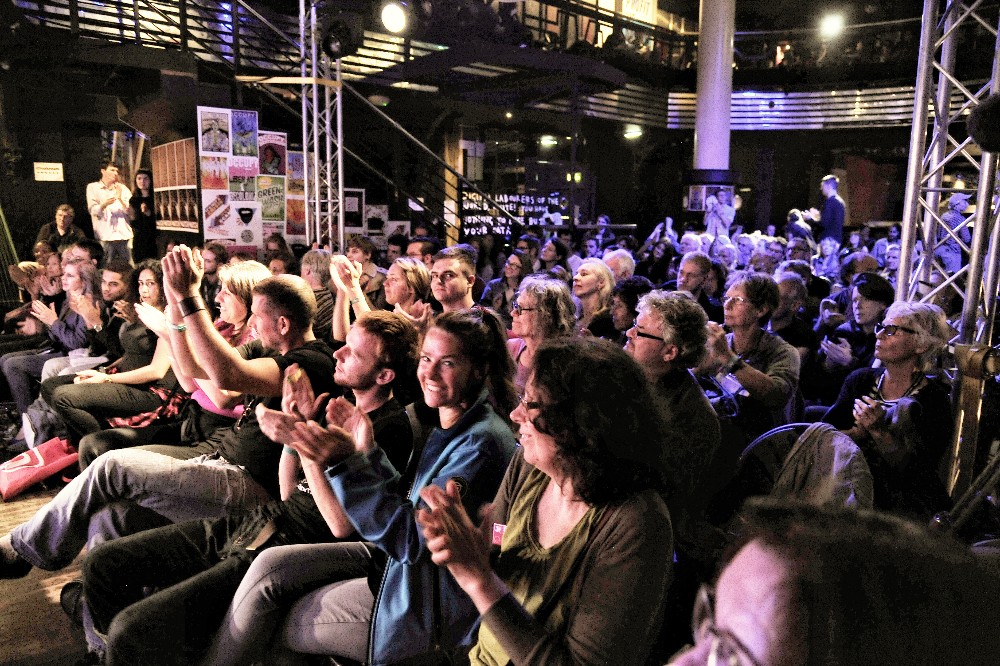
The World Transformed (TWT) is, in many ways, an initiative striving to answer some of the key questions and challenges confronting the left today. Taking place parallel to the Labour party conference, the creativity and vibrancy of this four-day-long festival of politics, arts and music is a profound break with the dispiriting orthodoxies of establishment politics.
The resurgence of the Labour party under Jeremy Corbyn has been a crucible for widespread, youth-led disillusionment with austerity and neoliberal dogma, animated by and consolidating the resistance movements sparked since the financial crash. Labour’s electoral successes have been underpinned by a return to the party’s socialist roots, harnessing the power of its vast membership base to pose a radical alternative to communities failed by business-as-usual. In order to formulate, execute and extend this vision of emancipation, the base must be empowered in and beyond elections through rigorous debate, grassroots organizing, and robust cultures of community-forming crystallised in institutions like TWT.
This meeting of electoral strategy and social movements – from Labour to Syriza to Podemos – is precisely the defining feature of a social democratic tradition that is necessarily reinventing itself after years of accommodationism and capitulation. Without the popular will to hold social democratic parties to account, they will be compelled to fold to pressures of the market, to notions of ‘security’ or the ‘national interest’, and to the short-term expediency of ‘electability’ – diluting principles of opposition and constraining political potential and power. With continued internal threats of sabotage from the right of the party, concerted vilification from business and the press, and with far-right tendencies strong-arming their way into mainstream political debate, only rank-and-file organization and collective action can counter the forces that seek to thwart a potential Labour government. We must be prepared to engage in broad-based, organized and continuous struggle on the streets and in our workplaces. The triangulations and contradictions inherent in social democracy can only be overcome by strong movements maintaining change at the political, social and cultural levels.
Movement building is not simply a means-to-an-end, but also an end in itself: to not only democratise the Labour party and ensure it wields its power in the interests of the many, but to transform the relationship of ordinary people to the state and their own lives. Whilst the state can and should be a force of resistance against the chaos of the market, our political horizons should not be siloed off to exclusive channels of elite representation. Narrow electioneering is insufficient to a popular desire for real control: politics ripples far beyond the halls of Westminster, defining our relationship to housing, to healthcare, to work, to local councils, to cultural spaces. We must collectively organize within every aspect of our lives to effectively redistribute control over these kinds of institutions, and to galvanize the day-to-day shifts in consciousness of what is possible and just.
This model of active participation and collective organizing is what projects like Acorn – a powerful tenants and community union – is already implementing across the country. When canvassing, its members ask about the everyday problems people are experiencing – whether with landlords, bosses, local councils – and attempt to draw out the political, rather than individual, nature of these problems to involve these people in organizing to change their own conditions. More than just data collection or electoral charting, door-to-door conversations are the beginning of an active, mass political process whereby ordinary people come together to face those that exploit them.
Most importantly, this kind of organizing works: Acorn’s string of victories provides an inspiring riposte to a shifting but still prevailing sense of political powerlessness. It also poses an example of the extra-parliamentary forces required to challenge the dearth of regulation on a local level, to directly expose and counteract ruptures in resource provision, and to catalyse people’s anger over indignity. Momentum is well-placed to facilitate and resource such struggles; its mass canvassing methods at the last general election had significant results and must be expanded into deeper community work.
Indeed, the difficulty in translating national ambitions to the local level in the wake of the general election resurgence gestures towards the need for bottom-up community models. The cultural seduction of nationalism continues to afflict mainstream politics, recuperating international class antagonism over globalization into trends of vicious xenophobia and nationalist protectionism. As a result, the debate has shifted ever further rightward on immigration and Islam, coalescing in violent far-right street movements, intensified racist street violence, and hostile environment atrocities. The left must be uncompromising in resisting this shift, and reckon with the unresolved imperialist currents underlining it. This entails developing our own liberatory vision and institutions of positive cultural belonging that can resonate with precariously housed migrants in our cities as much as laid-off steelworkers in the neglected deindustrialized heartlands. We must develop strategies to tackle the global reach of capital and push the debate on long-unanswered questions of state violence and borders to the left.
To address these pressing challenges and more, the left needs open spaces for collective political education and discussion within which we can build the long-term capacity of our movement far beyond the next election. By drawing together politicians, academics and grassroots activists from across the world, TWT is advancing a different kind of politics that breaks from bland, back-door bureaucracy and facilitates the revitalisation of a multifaceted, pluralist and truly transformative movement.
For more information and tickets for The World Transformed, click here.